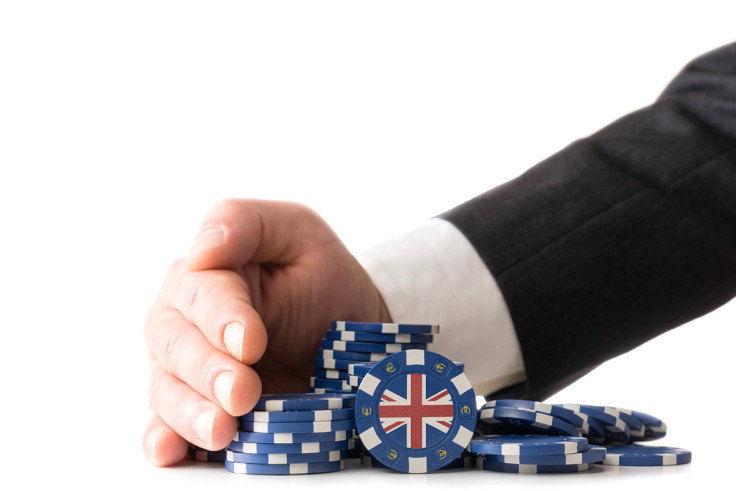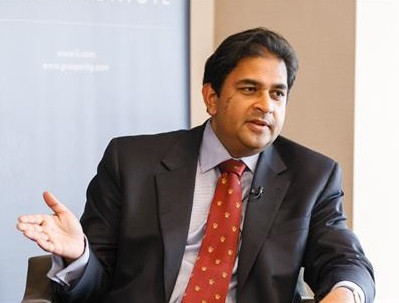Brexit and the free trade financial inclusion bonanza
Shanker Singham of the Legatum Institute and Open Europe's Vincenzo Scarpetta on how Brexit can make the world a better place.

For the first time in generations Britain's ability to negotiate free trade agreements will be un-frozen. Proponents of free trade see in Brexit a global vision that could drive financial inclusion across the developing world and kick-start a new economic engine.
In order to be able to do these sorts of trade deals, Britain needs to free itself from the customs union — through which the European Union negotiates as a single entity in international trade deals — and from the EEA/single market.
Currently the EU has around 30 free trade agreements with over 60 third countries in the world and the UK is also party to all of those free trade agreements. But the EU still does not have a free trade deal with huge economies such as the US (worth 13% of the UK's global trade), China, Japan, India, or Australia.
According to Vincenzo Scarpetta, a senior policy analyst at Open Europe, Brexit will be neither apocalypse nor utopia. In terms of GDP impact on the UK, a realistic range is between a 0.8% permanent loss to GDP in 2030 – where the UK strikes a comprehensive trade deal with the EU but does nothing else; and a 0.6% permanent gain in GDP in 2030 – where it pursues free trade with the rest of the world and deregulation, in addition to an EU free trade agreement.
"If the UK after Brexit were to remain an open country and embrace free trade with the rest of the world, and embrace regulation domestically, the UK could see a permanent gain to its GDP of up to 2.2% in 2030. We are talking about a long term projection; 2.2% is like the best case scenario. The most politically feasible one is around 0.8%, so around 1% of GDP in 2030," said Scarpetta.
Prosperity vacuum
There are really no good stories out there about trade agreements of the sort that bring openness and liberalisation: Doha is dead, the Transatlantic Trade and Investment Partnership is dying, and Donald Trump has now declared the Trans-Pacific Partnership is also finished. This creates a vacuum for countries like the US, Australia, New Zealand and Singapore with which the UK could do deals, creating a prosperity zone of like-minded countries committed to eliminating tariff and non-tariff barriers.
For Shanker Singham, chairman of the Legatum Institute Special Trade Commission, UK is in a privileged position. It has good relations with almost every country and plenty of soft power to boot and now must grasp the nettle of free trade.

"Britain cannot remain a member of the single market because some 80% of our exports are services, and no country will negotiate services access with you if you can't put your domestic regulation on the table," he said.
In handling its own domestic regulation, the UK will deal with the sorts of barriers to trade that are effective in the 21st century, such as behind the border barriers and regulatory anti-competitive market distortions. Alternatively, Britain could cling on to what it has and hope to do some goods agreements here and there, in the same way that Switzerland or Iceland has an incredibly one-sided deal with China, most of which relates to goods with hardly anything on services.
Freeing value chains
Singham is also enthusiastic about financial inclusion and the deals the UK could do with developing world countries once we are agriculturally open. "There are whole agricultural sectors where we don't produce the goods that a lot of these developing countries produce. Think of mangoes from India and rice from India and so on. We can have no tariff and no quota on those products, provided they are not directly competitive or substitutable with another product that we do produce."
The EU is closed on agriculture, but it takes pity on poor developing countries by giving them a generalised system of preferences (GSP), which means a preferential tariff of a certain percentage. However, the actual bound tariff that could be paid remains very high and the GSP can be withdrawn by the EU for any number of reasons, as has happened to countries like Bangladesh and Sri Lanka, for example.
This type of thing happens because the EU does not like something else they are doing, perhaps to do with their rule of law, or perhaps they are not democratic, or had some problems with an election. Singham says the sheer contingency of such a system prevents farmers from moving up the value chain; as such he refers to supply chains in poor countries as "calcified".
"From a farmer's perspective, they can't rely on that GSP tariff. Say I produce coco beans; the chocolate tariff into the EU with the GSP rate is 4%; the non-GSP rate is 40%. But the farmer does not have any confidence in the 4% rate that their business is relying on. They may want to bring in dairy, make chocolate and sell it into the EU, paying the 4% tariff, but what happens if suddenly the EU decides it doesn't like an election, or a leader. The farmers lose GSP and now have to pay the 40% rate. This keeps supply chains calcified; you can't change them on this basis," he said.
The EU has been heavily criticised for this strategy and has promised to lower tariffs to an immutable zero for the least developed countries in the world, but it is a tiny group of countries that are eligible. As far as negotiating free trade agreements goes, the EU may put four or five agricultural goods on the table for a negotiation, as they have in the EU/Central America agreement.
CAP and subsidies
Leaving the Common Agricultural Policy (CAP) allows the UK to tackle the full range of tariffs. This opens the thorny question of subsidies. The UK has little in the way of production subsidies. There are two programmes in Scotland: voluntary coupled support for sheep and beef farming, which is about £38m. By comparison the French voluntary coupled support is about a billion euro. It is not just tariffs and quotas that make life hard for developing world farmers, subsidies inside Europe distort pricing and excess production has to be dumped on world markets, lowering prices.

Direct subsidy payments to farmers, which are the first pillar of the CAP, are clearly dysfunctional and need reform. Open Europe's Scarpetta believes the CAP should be much more focused on boosting environmental stewardship and more modern agricultural development, rather than just paying farmers based on how much land they have.
"CAP has always been something the UK would have wanted to change, even from inside the EU. But there are likely to be pressures from British farmers to try and safeguard the subsidies they receive via the EU budgets. So that's something that the government will have to keep in mind and perhaps think of some kind of phasing out scheme," said Scarpetta.
An agricultural policy can be crafted that opens the UK to other countries while creating an environment where UK farmers can thrive. There are examples around the world of countries which transitioned from a highly subsidised, protected farming industry sector to a highly open one with basically no subsidies, no tariffs and no barriers. New Zealand is the best example of what can be achieved, where an incredibly efficient industry was created, now the biggest dairy exporter in the world.
"We would advocate firstly opening up on the tariff quota side," said Singham. "But for products we produce, we can maintain one level of tariff to protect our farmers. We also have to protect our farmers from imports of products from countries that distort their markets because, unlike New Zealand, we are sitting on the edge of the world's biggest agricultural distorter. There are going to be many products coming from Europe whose costs will have been lowered by all kinds of subsidies and distortions.
"We need a mechanism that protects our farmers from those, but doesn't distort trade from products that are coming in that are better quality and cheaper for reasons not related to government distortion," he said.
Moving away from direct transfer payments that simply pay farmers to farm, allows for a focus on environmental remediation. Bridging loans could be available to farmers to use their land for other purposes that might revolve around tourism or property development. Another idea is to create a retirement fund for farmers.
"There are lots of very specific, tailored measures we can do because we have a £2.8bn envelope under the CAP. We should certainly use that, but in a more focused and targeted way, and I think what you will find is most farmers in the UK, and most of the NFU would actually quite support that."
Principles-based partnerships
Singham says it is worth remembering that developing countries constitute most of the world. If the UK has a sensible partnership agreement with them it will affect the way those countries perceive Britain, not only in trade, but also in the UN and foreign policy circles.
"Typically a lot of developing countries are quite oppositional and adversarial with the developed world; they tend to call us hypocrites because we ask them to open up but are not open ourselves. Foreign policy is then viewed through the same lens. So now we can actually have a principles-based foreign policy, because we have a principles-based partnership agreement with these countries."
Creating free trade agreements with developing countries and prosperity zones with developed nations, plus sorting out our domestic regulatory policy, will result in a massive increase in global world products, states Singham.
"We are talking about a 1.5% - 2.5% injection into global world product year on year for 15 years, assuming that's how long it takes to reduce distortions to a certain level as a result of all these agreements. So it's transformational. It's creating a global economic engine that doesn't exist today."
© Copyright IBTimes 2025. All rights reserved.






















